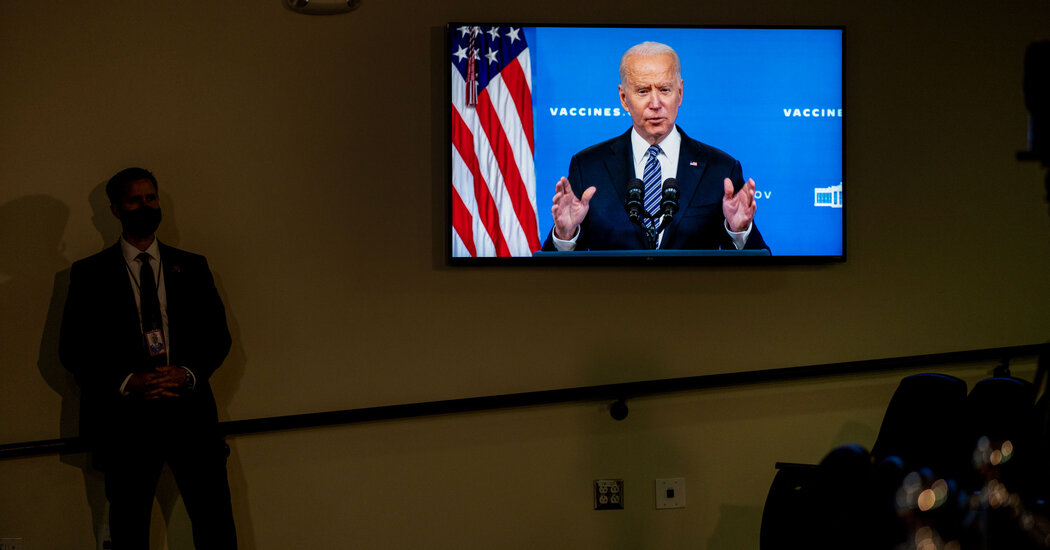
President Biden is expected on Thursday to impose new vaccination mandates as part of a broad plan to put pressure on private businesses, federal agencies and schools to enact stricter vaccination and testing policies as the Delta variant continues its spread across the United States.
The spread of the highly infectious variant has pushed the country’s daily average caseload over 150,000 for the first time since late January, overwhelming hospitals in hard-hit areas and killing roughly 1,500 people a day.
Mr. Biden, who was briefed by his team of coronavirus advisers on Wednesday afternoon, is set to deliver a speech at 5 p.m. Eastern that will address about six areas where his administration can encourage — or, at this point, push — more eligible Americans to receive vaccines, according to the White House.
Officials offered few specifics, stressing that the plan was still coming together. But two officials familiar with the plan said that it would include new federal requirements for vaccination, and that its underlying message would be that the only way to return to some sense of normalcy was to get as many people vaccinated as possible.
“We know that increasing vaccinations will stop the spread of the pandemic, will get the pandemic under control, will return people to normal life,” Jen Psaki, the White House press secretary, told reporters on Wednesday. “That’s what our objective is, so we want to be specific about what we’re trying to achieve.”
The Food and Drug Administration’s decision last month to grant full approval to the Pfizer-BioNTech coronavirus vaccine has already prompted the Pentagon to require members of the military to be vaccinated. Mr. Biden said at the time that the approval should sweep away any lingering doubts about vaccination and spur more mandates.
When asked if Mr. Biden would be adding more detail to existing policies or would outline measures that would have an immediate and broad effect on Americans, Ms. Psaki replied: “It depends on if you’re vaccinated or not.”
Administration officials see signs that more people in the United States are open to receiving shots — some 14 million got their first shots in August, four million more than in July, Ms. Psaki said. But about 27 percent of the eligible U.S. population age 12 and older have not received any Covid vaccinations, according to data from the Centers for Disease Control and Prevention. In some of the hardest-hit states, the unvaccinated percentage is higher: 42 percent in Texas, for instance, and 38 percent in Florida.
About 1.3 million fully vaccinated people have received a third shot after federal officials approved them for people with compromised immune systems. Mr. Biden has publicly supported the idea of broadening the availability of third shots as boosters for much more of the population, but health experts have advised the White House to hold off promoting that for now.
On Wednesday, Ms. Psaki said that the White House was working toward a plan for boosters, but did not give a time frame. She told reporters that Mr. Biden had chosen Thursday to deliver an extensive speech on the virus because he understood it was “top of mind for Americans” as they return to schools and offices.
The president will also be seeking to course-correct after a difficult month for his administration, directing the public away from a chaotic and violent end to the war in Afghanistan and back toward his administration’s efforts to curb a pandemic that has upended every facet of American life.
But amid renewed fears of the virus’s damaging effect on the economy and the prevalence of a troublesome variant, even Mr. Biden’s allies say it will take more than a speech to ease concerns that the virus has once again spiraled out of a president’s control.
“He ran on competence, bringing adults back into the room,” said Nick Rathod, a former domestic policy adviser to President Barack Obama. “This is something that he needs to take control of and show his level of competency. I think that’s why he was hired.”




